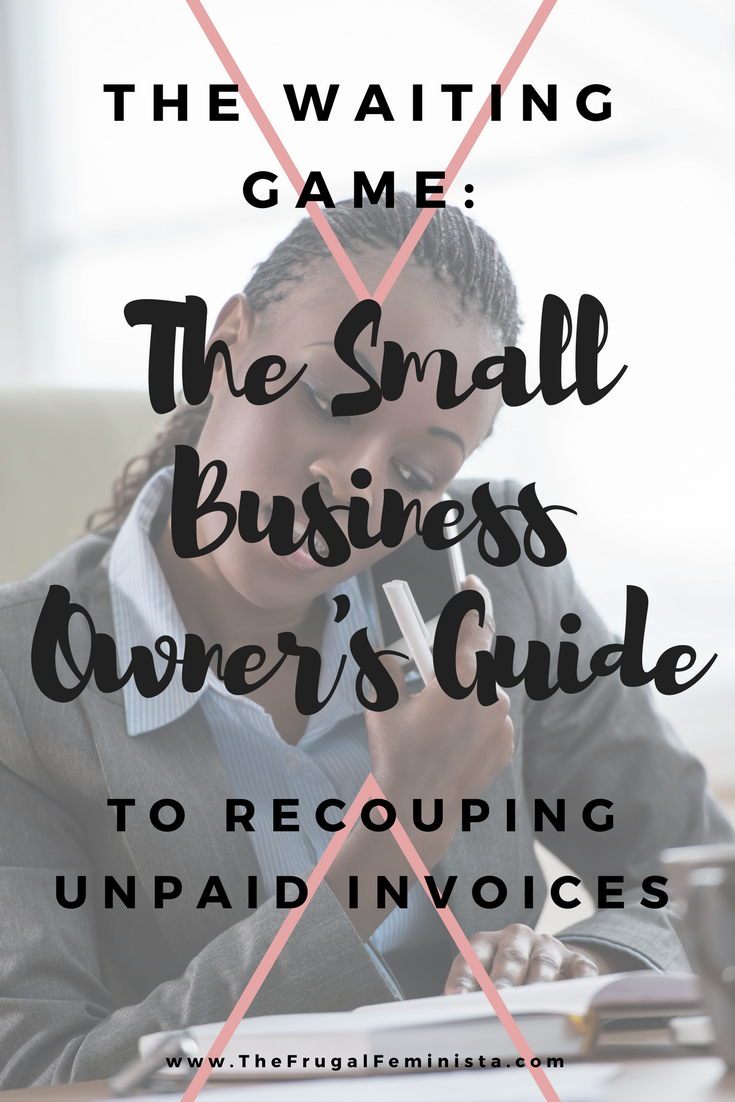

If small business owners didn’t have enough to worry about—finding clients, marketing, paying employees, and scaling their business— they also have to deal with one of the biggest enemies to positive cash flow in their business and sustainability: chasing down delinquent clients for piles of unpaid invoices.
Abiola Abrams, spiritual self-worth and business coach to soul-centered women entrepreneurs had a stack of unpaid invoice totaling close to $4,000 from Glam Media, who abruptly shut its doors last year.
And to date, she hasn’t seen one red penny, “I have not recouped anything… and I have heard the same from many others who were in the same position.”
I can commiserate. Since the first quarter of this year, I’ve had two invoices which have been past due over 120 days; one for freelance writing and the other for a shipment of books.
Unfortunately, our stories are behind some glaring statistics. According to study conducted by the CEO of Fundbox and his team, “the total amount in unpaid invoices across all U.S. small businesses is approximately $825 billion.”
Yes, that is a “b” for billions.
If you’re in a similar situation or just want to play defense, here are some guidelines to increase the chances you’ll be paid in full and on time with every invoice you submit.
Before You Agree to a Project
[Tweet “You can create a lot of problems for yourself if you don’t have a signed agreement with your client”]
Create a well-written contract that lays out all of your expectations. You can create a lot of problems for yourself if you don’t have a signed agreement with your client. In your contract, you’ll be able to delineate:
If clients aren’t willing to comply with the provisions within the contract, it may signal a “red flag” and spare you financial headache in the long run.
Make payment easy. Offer to receive payment in a number of ways. In addition to receiving payments via credit card, opt to receive payments via PayPal, Stripe, checks, and Automated Clearing House (ACH) payments.

Once Invoices Go Unpaid
Follow-up with friendly emails and phone calls. Whether you use an online service that automates the accounts receivable and collections process for your small businesses or you do so manually, make sure that you follow-up politely and persistently. In your email correspondence, be sure to remind them of the contract signed and your desire to bring the account to date as soon as possible. Keeping communication open and professional makes it easy for delinquent clients to save face and provide an explanation for the late payment. It also makes it more possible to create payment plans or schedule an in-person meeting to collect payment.
Sue in small claims court. Small claims court is a state court that resolves disputes involving relatively small amounts of money, usually ranging between $2,000 and 7, 500, depending on the state. If the client fails to show up to court, you win the case by default. If the client loses the case and fails to pay the judgment voluntarily, you can employ traditional collection techniques, which include property liens and wage garnishments.
Hire a collections agency. Most companies send accounts to a collection agency when they are over 90 days due. With more than 5,000 collection agencies in the United States, it’s important that you choose one that has a track record of success using ethical and above-board strategies and tactics to recoup money. A quick search of the Better Business Bureau or ACA International, the Association of Credit and Collections Professionals can facilitate this process.
Also be clear on the collection agency’s terms of payment. Some debt collection agencies don’t charge a fee until they recoup payment. Others require a percentage of whatever amount recouped, even if they weren’t able to secure 100% of the outstanding payment. For example, if they charge a 30% contingency fee on any amount recouped and they secure $60 from a $100 invoice, you will walk away with $42 and they will pocket $18.
Work with an attorney. Hire a lawyer that specializes in breach-of-contract cases. Retaining a lawyer will cost you upfront so ensure that the cost of contracting a lawyer doesn’t further limit your cash flow. You can also hire an attorney to draft a demand letter, which makes a demand to the client to either make a payment or set a timeline within which said payment should be made. Demand letters sent by an attorney may be more effective at getting a client’s attention.
Write off the loss and move on. After you’ve fought the good fight, you may have to realize that you’re never going to see that money. If you’ve provided a product to a client and received no payment, you’ll be able to write it off the bad debt. Unfortunately, this caveat doesn’t apply to service-based businesses. According to Stephen Fishman, J.D., attorney and author focused on business, taxation, and intellectual property matters for small businesses, “The rationale behind this rule is that it would be too easy for independent contractors to inflate bills and claim large deductions for bad debts that were never really incurred.”
Small businesses are a major part of our country’s fiscal backbone, but according to a recent Fundbox study, 64% of these small businesses are adversely affected by late payments or no payments. When small businesses go unpaid, there’s a huge impact on our economy. Small businesses use their invoices to buy equipment, hire new talent, pay for marketing and advertising as well as increase salaries and inventory.
That’s why it’s imperative that we honor the contracts that we create with small businesses— to ensure that these businesses are able to grow and thrive to continue to provide the goods and services we desire.